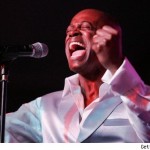 Kem W/ Musiq Soulchild & Ledisi
Kem W/ Musiq Soulchild & LedisiMarch 30, 2011, 7:30 pm
Club Nokia Los Angeles, CA Kem has carved a niche for himself in the music world. His jazz-influenced contemporary R&B vocal styles are claiming a loyal following in an African-American musical environment dominated by hip-hop sounds. When he signed to the venerable Motown music label and his debut release, Kemistry, climbed to the top reaches of industry urban-music sales charts, these events marked the beginning of a new chapter in Kem’s life. His career accomplishments were personal milestones as well, for they came at the end of a series of trials that extended down to the depths of homelessness. With a five-album deal inked at Motown, Kem stood ready to make music that fit neatly into a set of retro trends that had appeared in African-American music, and at the same time was rooted in his own experiences.
Influenced by R&B giants of the day like Stevie Wonder and Marvin Gaye and by jazz-popsters Steely Dan and Grover Washington Jr., Kem became fascinated by music in high school. He sang in the choir, kept up with releases by Michael Jackson, Prince, and jazz-pop phenomenon Al Jarreau, and gravitated toward musically talented classmates like keyboardist Brian O’Neal. The Kemistry album, almost alone among recent R&B charting releases, was the creation of live musicians. “That’s the key to the magic of this record,” McMurray told Ebony. “I think he has something really unique.” The group began playing around 1993 and had its first major gig when it won an opening slot for singer MeShell NdegeOcello at the Royal Oak Music Theater outside Detroit.
While most of the musical world was headed toward the exploitation of electronics, Kem moved in the opposite direction. The Kemistry album, almost alone among recent R&B charting releases, was the creation of live musicians. “That’s the key to the magic of this record,” McMurray told Ebony. “I think he has something really unique.” The group began playing around 1993 and had its first major gig when it won an opening slot for singer MeShell NdegeOcello at the Royal Oak Music Theater outside Detroit.
From then on, Kem’s rise to national prominence was mostly due to the hard work he put into the enterprise of self-promotion. Other opening slots, for War and Donald Byrd, followed, and the singer made some outside income by writing music for a McDonald’s commercial and singing for weddings. He also sang with the Church of Today choir, based at Renaissance Unity Church. His band performed at Detroit’s African World Festival and began to generate a buzz among frequenters of the city’s active urban music scene. Along the way, he became the father of a daughter, Troi (as of 2003 he was engaged to be married, but kept the details private). In 1999, he recorded a live version of what became the Kemistry CD at a Detroit coffeehouse. A severe self-critic, he wasn’t pleased with the results. “I just didn’t like it, and I decided not to release it,” he told the Scene Entertainment Weekly.
Detroit music fans had a different opinion of the music, though, and unofficial copies of the album circulated around the city. Kem passed an important turning point when he quit a nine-to-five job in 2001 in order to devote full time to his music. Aware of the demand for his music, he decided to record a studio version of Kemistry. He financed the project by running up debt on a credit card.
When Kemistry appeared in 2002 on Kem’s own label, also called Kemistry, it was rare for a completely independent release to make much of an impact in urban music business. But Kem marketed his CD to beauty salons and black-oriented restaurants, persuading them to play the music on their sound systems and to sell the disc on consignment. “I gave lots of CDs away,” he told the Washington Informer. Word of his talents continued to build, and version two of Kemistry sold an impressive 10,000 copies over a five-month period.
That got the attention of executives at the Motown label, who signed Kem to a five-album contract in 2003 and released Kemistry for the third time. National critics like Ebony‘s Lynn Norment praised Kem’s “emotionally rich” music; his sound was often compared to Al Jarreau’s, but his lyrics had a depth and a tendency to take unexpected turns even when they dealt with conventional romantic subjects. “With my stuff, you have to pay attention to the words,” Kem explained to the Michigan Chronicle. “There is not a lot of kick behind it, not a whole lot of driving beat.” The singer’s four-octave range was another musical attraction. The album’s leadoff single, “Love Calls,” received heavy airplay on jazz and adult contemporary radio stations; Kem took to the road nationally; and the album cracked the top 20 of Billboard‘s Top Hip-Hop/R&B Albums chart.
A sign of Kem’s rising profile was that he successfully recruited Marsha Ambrosius of the innovative hip-hop duo Floetry to participate in a remix of “Love Calls.” The singer looked toward a more specifically spiritual project for his second release and often stressed that his own past life had played a role in the music he eventually made. “The rough spots in our lives give us character,” he explained to Jet. “I don’t regret the past…it’s an integral part of who I am.” Music fans were just happy to hear such a fresh take on old-school traditions. “What I’m most grateful for is that I didn’t give up,” Kem told the Detroit News. “Don’t quit before your miracle happens.”

0 Replies to “Kem w/ Musiq Soulchild & Ledisi In Concert, Club Nokia, Los Angeles, CA”